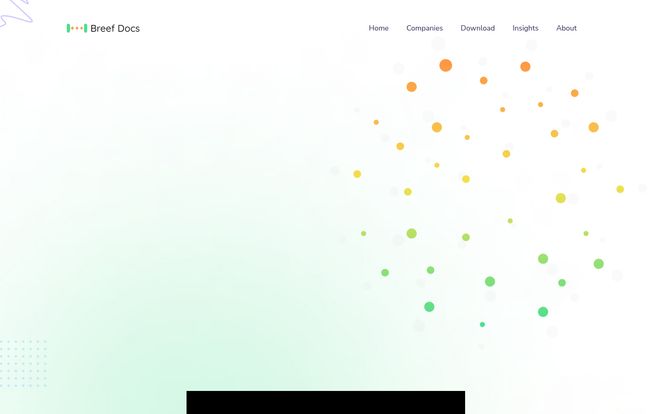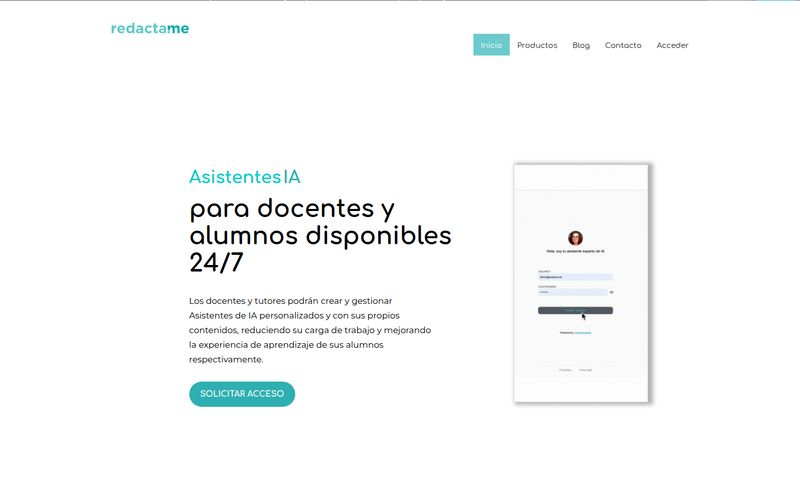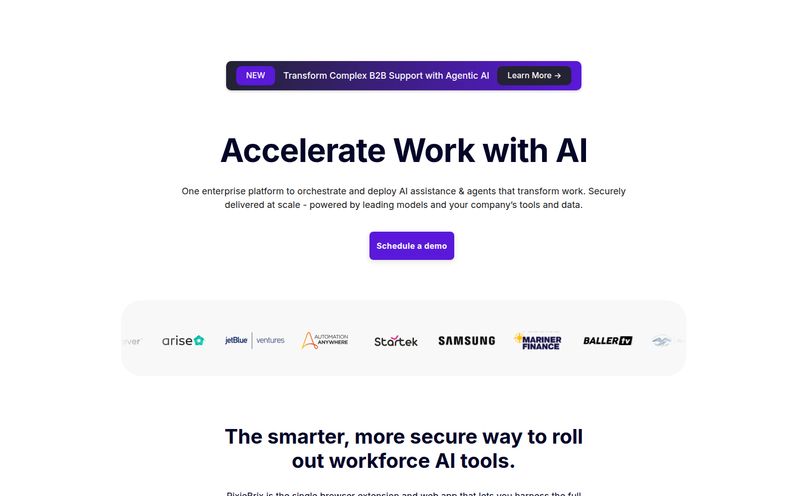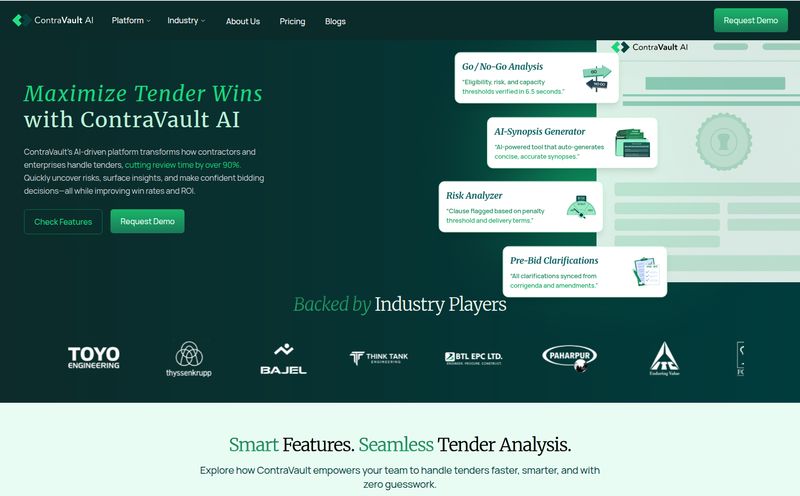Where does your company's important information actually live? If your team is anything like the ones I've worked with for the past decade, the answer is a chaotic mess. It's scattered across a dozen Google Docs with 'Final_v2_final_USE THIS ONE' in the title. It's buried in Slack threads from six months ago. It's living exclusively in the head of that one senior engineer who you're terrified to bother.
Sound familiar?
It's a universal pain point. We spend more time looking for information than actually using it. For years, we've tried to solve it with more folders, better tagging, and wiki platforms that start with good intentions but end up as digital graveyards. But now, with AI being crammed into every piece of software imaginable, a new breed of tool is emerging. And I just stumbled upon one that’s caught my eye: Breef Docs.
It’s not out yet—they’re currently running a waitlist—but the promise is big. The website puts it simply:
"Using Breef Docs is like speaking with a very knowledgeable colleague."
And that... that's a compelling pitch. It’s not just another database. It's an AI-powered brain for your team. A colleague who has read everything and is ready to answer your questions. Instantly.

Visit Breef Docs
What Exactly is Breef Docs? (And Why Should I Care?)
Okay, so let's cut through the marketing fluff. At its core, Breef Docs appears to be an AI layer that sits on top of your company's knowledge. You feed it your documents, your procedures, your project histories—all the stuff that normally gets lost. Then, instead of using a clunky keyword search that gives you 50 irrelevant documents, your team can just... ask questions. In plain English.
Think about the practical difference. Instead of searching for “marketing budget report 2023,” you could ask, “What was our total ad spend on Facebook in Q3 of last year?” The system wouldn't just find the report; it would ideally read it and give you the answer. That’s the dream, anyway.
This isn't just about finding things faster. It’s about democratizing knowledge. It’s about onboarding a new hire and having them get up to speed in days, not weeks, because they have a patient, all-knowing AI to query instead of interrupting their manager every 15 minutes. For an old-school SEO guy like me who's seen trends come and go, this feels less like a trend and more like a fundamental shift in how we work with information.
The Promise: Key Features of Breef Docs
Based on their site, Breef Docs is built on a few core pillars. Let's break them down.
Chatting with Your Documents: Natural Language Interaction
This is the main event. The ability to have a conversation with your data is a game-changer. We've seen this with ChatGPT, of course, but applying that same conversational power to a private, secure set of your own company documents is where the magic happens. No more wrestling with boolean operators or trying to guess the exact filename. You just ask. It’s how we’re all getting used to interacting with technology, and it makes perfect sense to bring it to the workplace knowledge base.
No More Knowledge Silos: Multiple Knowledge-Bases
I really like this one. A huge mistake I see companies make is dumping everything into one massive digital bucket. The marketing team doesn't need to sift through engineering documentation, and HR policies probably shouldn't be mixed in with sales battle cards. Breef Docs lets you create multiple, distinct knowledge bases. So you can have one for the tech team, one for marketing, one for company-wide HR stuff, etc. It’s a simple idea, but it’s crucial for keeping things organized and relevant. It's the difference between a well-organized library and a hoarder's garage.
Keeping Secrets Safe: Secure Access Control
Obviously, if you're uploading your company's brain to a platform, security is paramount. You can't have the summer intern asking about executive compensation packages. Breef Docs claims to offer secure access control, which I interpret as standard role-based permissions. This means you can control who sees which knowledge base and, presumably, what level of detail they can access. It's a non-negotiable feature, and I'm glad to see it highlighted.
The Magic Under the Hood: AI-Powered Search and Summarization
Beyond just answering direct questions, the AI is also there to summarize. Imagine throwing a 40-page market research report at it and asking for the three main takeaways. Or asking it to compare the conclusions of two different project post-mortems. This moves beyond simple information retrieval into actual knowledge synthesis. The time-saving potential here is enormous.
Let's Get Real: The Potential Upsides and Downsides
Alright, I'm optimistic, but I'm also a realist. No tool is perfect, especially one that hasn't even launched yet. Let's weigh the potential pros against the inevitable cons.
On the plus side, the benefits are obvious and incredibly attractive. You get faster access to information, a more intuitive way to search, and the ability to break down information silos with secure, department-specific knowledge hubs. The promise of an easy setup (their site shows a simple signup -> create base -> add members process) is also very appealing. If it works as advertised, it could genuinely reduce team friction and make everyone more self-sufficient.
However, we have to talk about the potential hurdles. The biggest one? The quality of your knowledge base is entirely dependent on what you put into it. It’s the classic “garbage in, garbage out” problem. If your existing documentation is a mess of outdated, contradictory information, the AI is just going to confidently give you messy, outdated answers. So, there’s an initial, and potentially significant, effort required to clean up and populate the knowledge base. This is a people problem, not a technology one.
Then there's the reliance on AI accuracy. We've all seen AI get things wrong. What happens when it misinterprets a critical policy document or hallucinates a project budget number? There will need to be a level of human oversight and a clear understanding that this is an assistant, not an infallible oracle. Lastly, there's the cost. This kind of service won't be free, and for small businesses, another monthly subscription can be a tough sell.
So, What’s the Price? A Look at Breef Docs Pricing
This is the million-dollar question, isn't it? As of right now, there is no public pricing for Breef Docs. Since the platform is still in a pre-launch phase and gathering users for a waitlist, they haven't released any subscription tiers or cost information.
If I were to guess, I'd expect a model similar to other modern SaaS tools. We'll likely see a tiered structure, probably based on the number of users, the amount of storage, or maybe the number of knowledge bases you can create. There might be a basic tier for small teams and an enterprise plan with more advanced security and support. But for now, your guess is as good as mine. The only thing to do is join the waitlist to be notified when they do launch and announce their pricing.
My Final Take: Is Breef Docs Worth Watching?
Absolutely. Yes. 100%.
Even with the potential challenges, the problem Breef Docs is aiming to solve is one of the biggest productivity killers in modern business. The approach—using conversational AI on a secure, private dataset—is the right one. It's what separates it from just being a slightly better search bar in an existing project management tool.
The success of Breef Docs will ultimately come down to three things: the quality of its AI, the simplicity of its user interface, and a pricing model that makes sense. If they can nail those three, this could easily become an indispensable tool for teams of all sizes. I've personally signed up for the waitlist, and I’d recommend anyone who feels that daily pain of hunting for information to do the same. This is one to watch. For sure.
Frequently Asked Questions about Breef Docs
- 1. What is Breef Docs?
- Breef Docs is an AI-powered knowledge base platform for teams. It allows you to upload your company's documents and information, and then lets your team ask questions in natural language to find answers, get summaries, and access knowledge quickly.
- 2. How is this better than just using Google Drive or Confluence search?
- Traditional search is based on keywords. Breef Docs is based on conversational AI. Instead of searching for keywords and getting a list of documents, you can ask a specific question like, "What are the steps for submitting an expense report?" and get a direct answer or summary, not just a link to a file.
- 3. Is Breef Docs secure for sensitive company information?
- According to their website, Breef Docs is built with secure access control. This means you can manage permissions to ensure that only authorized employees can access specific knowledge bases or sensitive information.
- 4. Can I use Breef Docs for different departments?
- Yes, one of its key features is the ability to create multiple, separate knowledge-bases. This is ideal for creating distinct hubs for different departments like Marketing, Engineering, HR, and Sales, preventing information overload.
- 5. When is Breef Docs launching?
- There is no public launch date yet. The company is currently operating on a waitlist model, so you can sign up on their website to be notified when they launch and to potentially get early access.
- 6. Will there be a free trial for Breef Docs?
- Pricing and trial information has not been released. However, it's common for SaaS companies to offer a free trial or a limited free plan upon launch, so it's a reasonable expectation.
A Final Thought
The quest for the perfect knowledge management system is a long and storied one in the business world. It's littered with failed wiki implementations and abandoned platforms. But maybe, just maybe, the intuitive nature of AI is the missing ingredient we've needed all along. I'm genuinely excited to see if Breef Docs can deliver on its very compelling promise.
Reference and Sources
- The official Breef Docs website (for waitlist and product information)
- How AI Is Changing Knowledge Work - An insightful article from Harvard Business Review on the broader trend.



